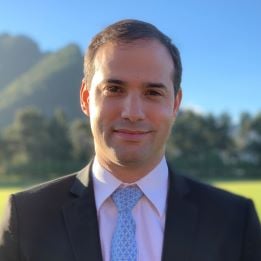

Chief counsel officer | GFT Technologies



Andrés Quintero Olmos
Chief counsel officer | GFT Technologies
Team size: Nine
How do you approach managing legal aspects during periods of instability or crises, and how does your legal strategy align with the broader business strategy to ensure the organisation’s resilience?
During crises, I lead my 9-person legal team with a proactive, business-focused mindset. We work closely with operations, finance, and communications to ensure fast, clear, and risk-aware decision-making. Our legal strategy protects the business while maintaining continuity. Equally important is understanding how each team member responds to pressure – nticipating individual reactions allows me to manage workloads effectively, maintain performance, and support well-being in high-stress situations.
What are the major cases or transactions you have been involved in recently?
I recently participated in GFT Technologies’ USD 95 million acquisition of Sophos Solutions, focusing on legal due diligence, regulatory and data privacy risk reviews, and contract alignment post-acquisition. This deal significantly expanded GFT’s presence in Latin America and strengthened its position in financial IT services. Following the transaction, I launched a regional compliance program targeting anti-corruption, data privacy, and governance in high-risk markets, enhancing audit readiness, stakeholder confidence, and operational resilience.
What emerging technologies do you see as having the most significant impact on the legal profession in the near future, and how do you stay updated on these developments?
AI-powered tools, especially in contract analysis and document review, are transforming legal, sales, and operations workflows by increasing efficiency and accuracy. We are actively implementing contract automation and exploring AI-driven risk assessment solutions. Predictive analytics improve efficiency by offering data-driven case outcome insights, while smart contracts streamline contract management with enhanced security. The growing adoption of specialised legal tech tools – or case management, e-discovery, and compliance tracking – further boosts efficiency, cuts costs, and increases accuracy.
How do you prioritise diversity and inclusion within your legal department, and what initiatives have you implemented to foster a more inclusive and equitable work environment?
Diversity and inclusion are key priorities in how I lead. My nine-person team is predominantly women, representing various regions of Colombia and graduates from different universities. We use inclusive hiring, mentorship, and bias training to promote equity and diverse leadership.
Diversity and inclusion are key priorities in how I lead. My nine-person team is predominantly women, representing various regions and ethnicities of Colombia, and graduates from different universities. We use inclusive hiring and mentorship to promote equity and diverse leadership. Beyond metrics, I foster a culture where every member feels valued and empowered through regular check-ins, open feedback, and encouragement of diverse viewpoints.
In your opinion, what are the main trends that are salient in your country currently (these can be legal, political, economy or business-based)?
Colombia is currently navigating political turmoil, with next year’s key elections likely to bring an unstable political environment. Key trends include tax reforms and regulatory changes focused on enhancing transparency and combating corruption, reshaping compliance across industries. Additionally, there is a growing emphasis on environmental, social, and governance (ESG) practices, driven by global pressures and national sustainability goals.